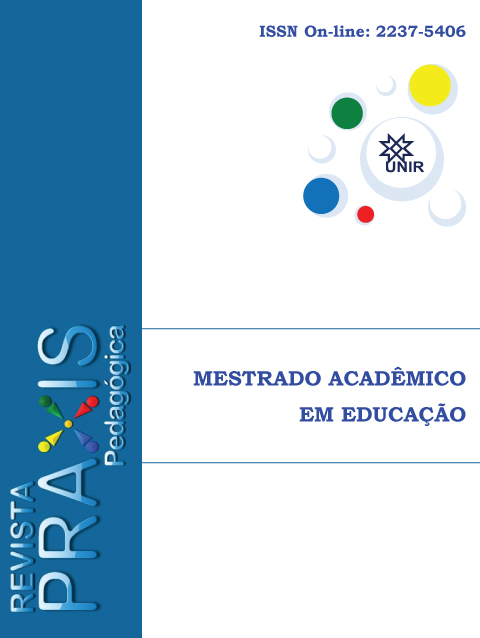A SAÚDE DO CURRÍCULO ESCOLAR EM ANGOLA
CONTRIBUTOS PARA UMA COMPREENSÃO E REFLEXÃO CRÍTICA
DOI:
https://doi.org/10.69568/2237-5406.2019v2n2e4280Palavras-chave:
currículo, política educativa e curricular, contexto, diversidade, descentralizaçãoResumo
A educação, que tem estado a enfrentar novos desafios em quase todo mundo, é o coração que bombeia o sangue do desenvolvimento de qualquer sociedade. O currículo, como o pulmão do processo educativo, precisa sintonizar-se aos tempos que pululam, tendo em conta as necessidades reais de cada região. Inserida nesta lógica, o artigo 105º, da Lei nº 17/16 de 7 de outubro do Sistema Educativo angolano contrasta com esse raciocínio ao colocar a tónica num currículo monocultural e de cumprimento obrigatório para um contexto plural e multifacetado. Neste sentido, o presente artigo propõe lançar um olhar crítico e reflexivo sobre a vitalidade do currículo angolano, gerando novas lentes de compreensão e subsídios no domínio da investigação sobre as questões curriculares. Os procedimentos metodológicos que nortearam a pesquisa foram o método dedutivo com abordagem qualitativa, pesquisa bibliográfica e documental, utilizando como colecta de dados, fontes primárias e secundárias por meio da revisão de literatura. No âmbito da tirania da inevitabilidade, os dados sugerem que, o currículo angolano, de tradição centralista e monocultural, precisa de alguns cuidados especiais, por possuir uma impressão digital ditatorial, por funcionar como uma camisa de força, por não dialogar com as diferentes culturas, desconsiderando as especificidades regionais, os talentos e os interesses, tanto dos alunos, quanto dos contextos, impondo-lhes de forma dissimulada uma cultura alienígena. Para isso, propomos a ressignificação das políticas e práticas curriculares assentes num currículo nacional de força mínima e partilhada, de inspiração multicultural, abrindo espaços para ecoar a voz e o grito das diferentes culturas, se quisermos desenvolver tanto as comunidades, quanto a qualidade do nosso sistema educativo.
Referências
ANGOLA. Lei de Bases do Sistema Educativo Angolano. Lei de Base do Sistema de Educação e Ensino Nº 17/16 de 7 de Outubro. Angola, 2016.
ANGOLA. Assembleia Nacional - Constituição da República. I Série-n.º 23, de 5 de Fevereiro, 2010.
AGOSTINHO, Piedade. Currículo e qualidade de ensino no contexto angolano. UDZIWI: Revista da Educação da Universidade Pedagógica, Moçambique, n. 30, pp. 1-12, 2018
ANGOLA. Ministério da Educação. Caracterização Global do Contexto Angolano e Respectivo Sistema Educativo. Reforma Curricular/INIDE. Luanda: Ministério da Educação, 2003.
AFONSO, Augusto. O papel do professor na (Re)Construção do Currículo do 1º Ciclo do Ensino Secundário em Angola: das intenções às práticas (Tese de Doutoramento). Universidade do Minho, Braga, 2014.
BORDIEU, Pierre. A miséria do mundo. Tradução Mateus Soares et. al. 2ª ed. Petrópolis: Vozes, 1997.
COUTINHO, Clara. Paradigmas, Metodologias e Métodos de Investigação.
Lisboa: Almedina, 2011.
SACRISTAN, Gimeno. Poderes instáveis em educação. Tradução de Beatriz Affonso Neves. Porto: Artmed, 1999.
JULIÃO, António. A Extensão da Unidocência no Ensino Primário em Angola: Implicações para a Qualidade de Ensino. Revista Educação Unisinos, São Leopoldo, Brasil, v. 23, n. 3, pp. 455-470, jul/set, 2019 b
______. A Autonomia Curricular do Professor em Angola: Limites, Desafios e Possibilidades. Revista Praxis Pedagógica, Brasil, v. 2, nº 1, pp. 1-14, jan/mar, 2019.
LEITE, Carlinda. Para uma escola curricularmente inteligente. Porto: Edições
ASA, 2003.
LEITE, Teresa. Diferenciação curricular na resposta às necessidades educativas especiais dos alunos. In I. Sanches, M. Costa & A. Santos (Eds). Para uma educação inclusiva: Dos conceitos às práticas. Lisboa: Edições Universitárias Lusófonas, 2012.
MOISÉS, Rosalina. "Os ritos de iniciação no distrito de Lichinga: desafios para a educação". In: Duarte, Stela e Maciel, Carla (org). Temas Transversais em Moçambique: Educação, Paz e Cidadania. Textos da Conferência Organizada pelo Centro de Estudos de Políticas Educativas. Maputo, Editora Educar, 2014.
MORGADO, José. A (des)construção da autonomia curricular. Lisboa: Edições ASA, 2000.
MARCONI, Marina e LAKATOS, Eva. Técnicas de pesquisa (7ª Ed.). São Paulo: Editora Atlas, 2009.
ROLDÃO, Maria. Os Professores e a Gestão do Currículo. Porto: Porto Editora, 1999.
ROLDÃO, Maria. (2003). Diferenciação Curricular Revisitada. Porto. Porto Editora, 2003.
ROLDÃO, Maria. Estudos de Práticas de Gestão do Currículo. Lisboa: Universidade Católica Editora, 2005.
ROLDÃO, Maria. Gestão Curricular: Fundamentos e Práticas. Lisboa: Ministério da Educação, 1999.
RIBEIRO, António. Desenvolvimento curricular (5ª Ed.). Lisboa: Texto Editora, 1995.
SOUSA, F. (2010). Diferenciação curricular e deliberação docente. Porto: Porto Editora, 2010.
SOARES, Magda. Letramento: um tema em três gêneros. Belo Horizonte: Ed. Autêntica, 2005.
PACHECO, José. Currículo: teoria e práxis. Porto: Porto Editora, 2001.
TIMBANE, Alexandre. A complexidade do ensino em contexto multilíngue em Moçambique: políticas problemas e soluções. Calidoscópio. V.3, n. 1, p. 92-103, jan/abr 2015.
UNESCO. Declaração de Salamanca e Enquadramento da Acção: Necessidades Educativas Especiais. Salamanca: Unesco, 1994.
UNESCO. Declaração universal dos direitos linguísticos. Barcelona: UNESCO, 1996.
VELASCO, Marcelino e Timbane, Alexandre. O processo de ensino-aprendizagem do português no contexto multicultural moçambicano. RILP – Revista Internacional em Língua Portuguesa, nº32, pp.100-120, 2017.
Downloads
Publicado
Edição
Seção
Licença
Ao submeter um artigo à Revista Praxis Pedagógica e tê-lo aprovado, os autores concordam em ceder, sem remuneração, todos os direitos de primeira publicação e a permissão para que Praxis Pedagógica redistribua esse artigo e seus metadados aos serviços de indexação e referência que seus editores julguem apropriados.


